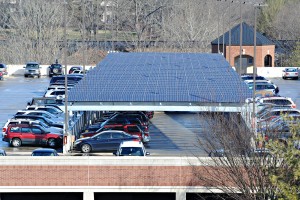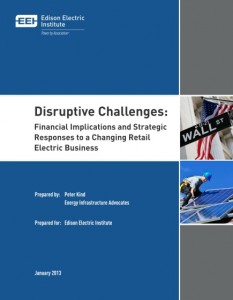Sep 03, 2013
Utilities Respond to "Disruptive Challenges" by Opposing PPAs
In July, journalist Ryan Tracy, highlighted a familiar dispute in solar development – the ability to sell electricity in territories where incumbent utilities have exclusive service rights to customers. The solar industry has heard this issue before, and in Iowa, the issue is at the heart of a lawsuit, expected to play out this year.
Eagle Point Solar, LLC – an Iowa based solar developer – is in the middle of a dispute over a Power Purchase Agreement contract (PPA) with a Dubuque (IA) municipal building. Alliant Energy Corp – one of the state’s largest utilities – is arguing against the contract on the basis that Eagle Point Solar would be selling electricity to one of their customers, leading to “a proliferation of solar installation in the state,” stated a representative from MidAmerican – another Iowa utility who is supporting Alliant energy.
Barry Shear, president of Eagle Point Solar, LLC states utilities “are proponents of renewable energy…if they own the energy assets and the electrons flow through their grid and they can bill you.”

Virginians know this song and dance. In 2011, PPAs – a recognized financing method allowing customers to enjoy renewable energy and access to tax credits providing economically viable systems – were challenged by Dominion Virginia Power on the basis that utilities were given exclusive service territories in which to sell electricity to customers. Whilst many customers were simply seeking the best prepaid electricity near me at the time, this challenge caused issues with distribution. Dominion’s challenge focused on a PPA arrangement between Secure Futures, LLC and Washington and Lee University. Dominion issued two “cease and desist” letters to Secure Futures, addressing their legal concerns. Avoiding massive litigation costs, Secure Futures and W&L agreed to convert the PPA into a lease, erasing the use of any tax benefits for the project.
In Iowa’s case, an Iowa District Court judge ruled in March that Eagle Point Solar could sign PPA contracts in Alliant service territory on the basis that the contract is allowing the city to decrease its demand for electricity from the grid. Alliant Energy, along with other state utilities, will appeal the judges ruling to the state Supreme Court this year.
Why do we continue to hear similar situations playing out throughout the U.S.? What is the basis for resounding opposition towards PPAs by incumbent utilities? While the answer is a simple one, it remains complex: distributed generation threatens the utility’s bottom line, and PPAs provide a catalyst for this threat. Therefore, an Iowa Court’s ruling may set an important precedent for distributed generation across the Mid-West.

Utilities are recognizing the growing popularity and familiarity of distributed generation – the fastest growing market in the U.S. The Edison Electric Institute (EEI) – an association representing all U.S. investor-owned electric companies – released their January 2013 report named “Disruptive Challenges: Financial Implications and Strategic Responses to a Changing Retail Electric Business“.
The report details the technical and economic changes expecting to challenge the electric utility industry – defining solar photovoltaic (PV) as “disruptive technologies”. The disruptive challenge for utilities: “adverse impacts on revenues, as well as on investor returns.” The strategic response: LIMIT. EEI’s report outlines immediate actions – including revisions to any net-metering programs, monthly service charges and tariff structures for end users.
The argument over PPAs in utility service territories will remain a familiar sound for the solar industry. However, a familiar dispute enhances a familiar trend – barriers to solar development continue to be challenged and often result in resounding success. Even in the “dark state” of the Commonwealth – where electricity prices are below the national average and the state offers no incentives – the solar industry is making strides, successfully passing PPA legislation in the 2013 General Assembly, with support from the industry, environmentalist, and Dominion Power.
Across the nation, the solar industry has succeeded despite economic and policy challenges in certain pockets of the country. Policy challenges loom large in states like Iowa and Virginia. In Iowa, this particular challenge now rests in the hands of the State Court. All over the country, including in Texas, there are people using different reviews similar to cirro energy reviews, that allow people to find better tariffs to suit them. Hopefully, the State court will consider a way of how to manage the electricity tariffs using the newly installed solar energy schemes.